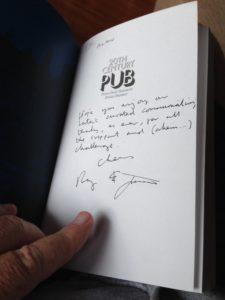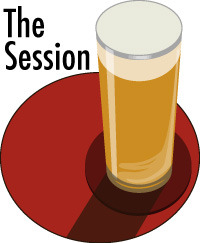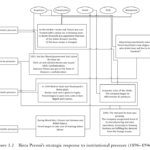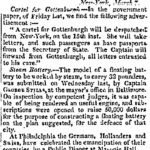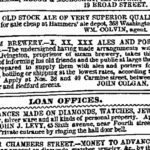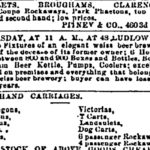I have been playing with this addition to the adventures of Al and Max first shared with the world in 2014’s cult classic, The Unbearable Nonsense of Craft Beer. The five whole reviews of that first book left at Amazon have meant the world to me since that time. It is still available at a very reasonable $12.95 at Lulu and I assure you Max keeps every penny. He’s worth it.
I have played with the character of Al in a few posts a few years back but this larger piece has sat building itself in draft almost since the book came out. It is still in unfinished shape but I am not sure I will get back to is so… here it is. Oh, and you didn’t miss this post. I published it on 6 January but dated it to August 2017 when I last played with the draft.
+++++++++
1. The Shed
Alan was standing out in the backyard. He stood about ten feet from his shed, staring at it. He had gone out to put in a few more hours getting the garden ready for this spring’s seeds but for while now he had been staring at his shed. Again. His youngest child was staring at him from her bedroom window.
“Mommy!” she shouted downstairs, “Daddy’s staring at the shed again!”
He was. It’s true. He was just staring at the shed. He couldn’t get over it. It changed his life. How had Max and Ron materialized through the back of the shed all those times and now nothing? Then, what made that door to other places and other times close itself to him? He got mad for a while. Then a bit glum. Then, when winter passed, he found himself just staring. He had tried to find the invisible button, ran his head over every inch of the damn thing, kicked every half rotten board trying to figure it out. It was becoming clear that his portal was now just an outside closet full of little used tools and broken bikes.
“Come on in for supper, Dad,” the boy called, leaning out the back door.
“OK. I’ll be right in.” He didn’t move.
“Mommy! Daddy’s still staring at the shed!” his youngest shouted again a few minutes later.
_
He thought he had moved on. He was going to work. Keeping up with the laundry. You are never prepared for when a project is done, he said to himself. The porch gets painted. The manuscript goes in. The co-worker gets assigned to another job. Snow comes. Six months later you are so deep into the next job you’ve pretty much forgotten about the day to day crap the last one – and the one before that – stuck you with.
But then one night he had a dream. In the dream he was staring at the shed. That was nothing new. Shed staring dreams were common. They competed with that dream about the boss springing the grade 11 math exam on him without warning. But on this night the shed door was open. And there was something glowing at the back.
Al awoke. He couldn’t shake the idea that the dream meant something. He tweeted Max who, with the time change east, was already in the pub over in Prague.
@pivnofilosof: You had a dream about your shed? Again?
@agoodbeerblog: Yes… but it was more like the shed was talking to me in my dream.
@pivnofilosof: Have you been drinking?
@agoodbeerblog: No. Just put on coffee, why?
@pivnofilosof: I dunno. Maybe because you are tweeting me about your goddamn shed again?
@agoodbeerblog:Oh, OK. I suppose. But this time it was different.
Max read the messages from Al patiently. It had been weird. But he was Argentinian and understood weird. Al he went on and on, again, about the meaning of the dream. Well, Max really just sent tweets like “@pivnofilosof: oh yes?” and “@pivnofilosof: that’s interesting” as Al tweeted on and on for the best part of ten minutes. Max was in a pub on a sunny spring Saturday afternoon reading the paper and was enjoying himself too much to think all that much about a shed in Canada. Until that is Al got to the point.
@agoodbeerblog: It’s like the shed had a voice or at least wanted to tell us something.
@pivnofilosof: Us? It was your dream.
@agoodbeerblog: Us. You need to come over.
@pivnofilosof: No way. I am not starting this again.
@agoodbeerblog: I am not sure we really have all that much choice.
@pivnofilosof: What?
@pivnofilosof: WHAT?!??!
Alan was gone. Must have closed his computer. Screw that, thought Max. He was sick of the beer rant stuff. And a bit tired of Al. Nice guy but he hauled him though space and time and for what? The nonsense is still the nonsense and nothing is change. He read his paper a bit more, had another Únětická 10°.
Time to start thinking of supper. Before leaving for home, Max headed to the men’s room and, opening the door, he reached around for the light switch. Funny, he thought, it should be right there. He hand rested on a mop handle. No, it was a shovel. What the hell was a shovel doing here? He kicked something and tripped. “Why’s there all this crap in here?” he asked himself as he sat on his ass surrounded by junk in the dark. Max heard a voice calling.
“Hello?” Then the far end of the washroom the bright beam of a flashlight and a voice speaking in English. “Hello? Oh dear. Not a racoon at all. It looks like… Max?” It wasn’t the washroom. He was in Al’s shed.
“Fuck,” Max said. “Fucking fuck shit fuck.”
2. The Blue Glow That Spoke
Max was steaming. And bored. Hours had passed since he left Prague beer taproom. It was already midnight in Canada. He’d called home. Shouting and pleading in at least three languages Al didn’t understand. Arrangements could be made he supposed but until then here he was stuck with Al and that goddamn shed. They had been now staring at it for a few hours sitting on lawn chairs with Al going on and on about the shed. Max would be more than steaming and bored, however, if the shed in the corner of Al’s backyard wasn’t glowing a light neon blue. That was interesting. Weird even. Plus he has no idea how to get home.
“Maybe you should just walk into the light and let it envelop you,” said Alan trying to be helpful..
“Are you fucking joking? Walk into the light?” Max complained. “Let’s review how many times you get to do that in life. Once… and… oh, only the once.”
“Sorry,” Alan said, now remembering he had mentioned that idea about an hour ago. He looked at his beer. And the empty bottles by his chair. He now remembered he had mentioned it already a number of times. And everything else he could think of. He didn’t know what to say. He didn’t ask for Max to show up like this… not really.
“I have to get home, Al,” Max said for the seventeenth time. “I really can’t be here!” Max swung around and knocked his beer over. He looked down, his disgust with the situation moving up another notch watching the excellent ale seeping into the ground. He stared. He stared at it some more. It was night. He was in Canada. He didn’t wanted any of this.
“I can get you another, Max,” Al said. “There’s plenty. What do you want?” Max didn’t respond. Al was worried. Al had been getting a little worried for a couple hours now. He thought Max was really going to lose it soon. And he was trying to figure out how to keep his neighbours from calling the cops if Max let loose with another string of his startlingly diverse multi-lingual foul mouthed language. But Max didn’t. Not now. He was just staring at the shed.
“Look,” Max said quietly. He was pointing. Alan looked. The shed glow was stronger all of a sudden. And the spot where the beer had spilled was now glowing blue as well. The light was moving, growing. A figure in blue neon had formed in the shed door. A big shaggy topped bearded guy with glasses, half see-through, half… half a blue glowing tweed jacketed, a very familiar figure. He moved towards them. Max decided he was reaching even his maximum weirdness capacity.
Alan and Max looked at each other, at the figure in the door and at each other again.
“OK… this is weird,” Max quietly whispered to Al.
“Holy shit,” said Alan not at anyone in particular. Then the scene went quiet as all three looked at each other not moving. The man in blue moved over to the chair that Max had been sitting on, grabbed the back and pulled a blue glowing ghost clone of it towards him. He sat down with a smile.
“Jackson. Jackson’s the name. I think. Or was. Or might be. Not quite sure,” the figure said rubbing his chin, brows a bit furrowed. “Any chance of a beer?” said Jackson’s figure with an almost fatherly smile as he looked around. Alan put a beer on the table and the ghost’s blue hand reached over and pulled back with a blue neon replica of the beer in his hand. He drank deeply, downing half the bottle in one long draw.
“So… why am I here… and, umm, why is… where is here?” Jackson asked.
“We have no idea… Micha… Mr. Jacks…” Alan said as he was cut off by the blue figure.
“Look… one thing you need… I need to… to understand. I am not sure…. I am not Michael Jackson. Not really. I am something like him but not him. I’ve been dead for a while now and, you know, what with that whole merging with the singularity thing… it’s really hard to keep track of how much of what I was is still what I am.”
Neither Alan or Max knew what to say. So they just stared.
“Plus you are projecting your expectations all over me. That’s a little disconcerting.” He rubbed at his chest as if he was getting itchy.
“Sorry. err, Michael…?” Alan said confused looking at Max. Max was just staring at the ghost in blue now. But he looked like he was getting into this.
“So…” Max was gearing himself up to ask, “so, you are a bit of Jackson, a bit of the universal and a whole bunch of what we think of you?”
“Maybe… Exactly! Couldn’t have put it better… I think..” The blue figure said. He congratulated himself with the rest of the bottle of beer. He waived the empty at all, obviously seeking another.
Suddenly, music was coming from the shed. A falsetto singing “we-hee-hee” to a 1980s familiar beat.
“Is that…?” Max asked.
“Yes, we are all filed alphabetically in there,” the blue ghost said. “I have to listen to that all day and night. The King of Pop. Not what I expected in the world to come. If he hadn’t died so young I wouldn’t have had to put up with him yet.” He made a motion as if to grab at his crotch and then rolled his eyes. Al passed him another beer which again was left in his hand as Jackson drew away the blue clone. As Jackson drank, Al could feel the real beer in his hand lighten as the contents disappeared.
“… the way-eh you make-a me feel…” drifted out of the shed quietly, echoing.
“So, if you aren’t Jackson… what should we call you?” Al asked as he handed the form another beer, not noticing he was now tapping his toe to the ethereal beat. Another clone of the beer came into being.
The Jackson-like form paused. “Hadn’t thought of that… need another name to describe this state of being, don’t I. Of non-being… I suppose you could call me Hunter. I recall something about that…” He drew on the beer, nodding approvingly.
“OK, how about we don’t, Mike,” said Max, clearly now exploring some limits. If he was going to be stuck here, he thought, might as well set some rules, enjoy himself.
Jackson didn’t take offense. “Sure thing. I am open to suggestions. How about Fred. I always liked Freds. You can call me Fred. Freddie Mercury. Always had a soft spot for him. Once in a while, I can hear a few notes from his direction when the crotch man gives it a rest for a bit. Fred Hill. Fred Flintstone. Yes, Fred will do nicely,” said the figure in blue with a smile.
“Fred the beer by Hair of the Dog… Fred Eckhardt…” Alan continued listing out loud, still trying to be helpful despite the weirdness.
“Oh. OK, fine. I can’t be Fred,” said the figure as if he had remembered something quite important he had not recalled for some time. “Not Fred… he’s Fred… who am I?” he said trailing off. Looking around he added “… and where am I?”
“How the hell knows or cares… it’s not like I want to be here either,” Max snapped having gotten all a bit impatient as he stood to go get another beer. “Maybe we’ll just call you ‘you’ for now, if that’s OK. Let’s see how that goes.” He took a couple of steps towards the shed. “This is too goddamn freaky. I need to figure out how all this is going to get me back to Prague.”
“Prague?” The blue form asked? Alan made a quick face at the blue figure as if to say that was Max being Max, not to worry. He got a shrug in reply.“Prague is nice. I like Prague.”
“Me too.” Alan then realized he had never been to Prague, that he was making inane small talk with the semi-undead on one hand and, on the other, a magically transported Argentine wanting to be back in Prague. He got all weirded out again.
“So,” Max said rounding on the two seated figures, “my can you tell me a little about what brings you here this fine midnight?”
“Me?” the blue form asked, pointing at his own chest.
“Yes, you, for fuck’s sake. You!” Max said getting all pointy, raising his voice to match his irritation.
“Well,” he said, “it’s that anger of yours – it’s about that rant of yours. Your trips through time and space and the diary you published. It’s all come to our attention.”
“Your attention?” Max asked, “who’s that you, You? Are there other “yous” back in the shed?”
Al thought this “You” thing was already falling apart a bit. And he was worrying about the neighbours. Max was getting emphatic. He didn’t want to trigger that other sort of “Max being Max” thing.
“I was asked to pop by. I think. Yes, that’s it. I was asked to pop over and have a word. We just wanted to make sure that you two were not missing the point, losing your focus on what matter. You sounded so unhappy there for a bit,” he said. “It’s just beer, you know.” Jackson had another long approving draw on his beer.
Al could not believe his ears. Here he was. Looking at… the residue of what once was Michael Jackson… maybe, the spirit of the man who created the whole style nonsense, the one being on Earth who did more than any other to aggrandize the humble glass of ale – and he’s the guy who tells him that it’s just beer? Al’s mind raced, not knowing what to say.
“Oh, by the way… I can read some of your thoughts, too,” said the glowing blue man. “part of the whole other-sidey stuff. Sorry. Supposed to mention that. Quite interesting. Max, you have an absolutely filthy mind.” Turning to Al, he said ,”You can’t imagine…” .
“Oh, yes. Oh, yes I can,” Al replied, slapped again with the scarring experience of his travels with Max. So many new words. So many new bad bad words.
“Anyway,” the undead in blue said turning back to Max, “the general consensus back there,” he said pointing at the shed, ”is that your ranting ways have left you in a bit of a bind. You’ve snookered yourselves. You’ve come to dislike the thing you like, haven’t you? What’s the point of that?”
Max looked at Al and back at the speaker. “But you are… or, fair enough, were… the guy who started it all. Who got us into the predicament in the first place. Beer styles. Beer pairing. Beer expertise. You aren’t suggesting that’s all made up,” Max said, waving his hands around.
“No… no… well, yes… and no. I did have quite an interest in all that, I guess…” he replied a bit sheepishly. “But it was because beer was so underappreciated. You have no idea what it was like in the 1970s. I hardly have any idea. I can hardly remember it but what I do recall is that it was bad. Watney’s Red Barrel. You have no idea.”
“Yes, we get that, but how does that translate into what has happened to good beer? All the posing, the weirdo adjuncts, the overpricing… the communicators?” Al asked, wincing at the last word. “Surely, you have something to say about that?”
Max jumped in. “Let’s get to the point. How do you feel when people hold meetings and praise you ‘with many hosannas’ claiming there will never be another like you?”
“Didn’t work out too well for the last guy, all that hosanna stuff, did it?” he replied with a smile, turning to Max. “Honestly? It’s all a bit depressing, actually. I mean if I could be depressed. Which I can’t. Because I died. Or he died. Hmm… lets just say deadness resolves all that. It’s quite handy in a way…” He paused. “Don’t get me wrong. I spent my whole professional life looking for the next drink, the better drink – and I made it… here… or at least not down there. That must stand for something. I clearly was not all wrong, lads,” he said.
“Yes, there is that,” Max agreed. Alan nodded.
“So,” he continued, “while I am not going to agree with you on everything you wrote, I do see that it’s a bit like the person who loses a loved one and then drops all interest in life. I mean, if I was such an example of someone who went out and made my personal curiosity about beer into my rich life’s work, then why is the proper response to my early and untimely passing everyone putting one’s feet up? Saying there won’t be another like that Jackson guy? Surely to G… sorry… surely, my example itself ought to serve as reason to go out in the world, follow curiosity and find new things that I never saw. You’d think that’d be some sort of legacy.”
“Not passion?” asked Max.
“Ha! I don’t see too many of those “passion” people up where I ended,” Jackson replied laughing, waving his blue empty bottle again. Al handed him another of his shrinking stash. “Well, no, that’s not true. Plenty of good folk like Robert Langridge. You see them.”*
Alan rubbed his chin, thrown a bit. “I guess I see what you mean. But isn’t there another problem with your legacy? Is there enough elbow room for the gang following your footsteps? I mean you were one of the few who has made a decent buck, made a decent contribution from just beer writing. Is there enough beer money flowing from the brewers to the thinkers and writers?”
“Thinkers? Really? Look, grow up at bit, would you?” the glowing blue figure snapped. “You don’t have to die and sit for a semi-infinity in a place where time has no meaning mulling over stuff to know no one has a right to an income from an interest in good beer any more than you have a right to cash because you want to write. It has to be good writing to even be considered worth payment. Same goes for beer.”
“Exactly!” said Max exclaimed, “that’s my point!”
“Steady on, Max – it’s not all that profound,” The ghost paused and looked around. “By the way, any chance I could get a proper glass? Something of a goblet?” Jackson pulled a translucent litre can out from under his tweedy jacket and poured. “Your stash is fine, Al, but I brought my own just in case.” His translucent hand reached for the glass, poured and lifted a faint copy of the glass to his lips as the earthly one sat still empty before him.
“Does that really say ‘Westy 12’ on the can?” Max asked incredulously.
“And ‘Big Gulp’ and ‘As Seen on TV?’” asked Alan.
“It’s called heaven for a reason, boys…” the apparition said with a wink.
3. The Stars Still Stood Still
They talked. They drank. If time had had any meaning that night, hours might have passed. But as long as the blue figure was there, the mid-point of that night seemed to carry on, the stars holding their position in space even as the occasional comet raced by. The conversation carried on, Max showing less and less irritation and much more interest in what the blue ghost was saying.
“I remember realizing after enough folk I knew had died that they switched from being a subject to an object. Sometimes it happened immediately,” the visitor said. “One minute you imagine the next editorial meeting, based on the last one and the one before that. You don’t notice the guy in the chair next to you half the time but he’s a someone. Then you hear the guy’s kicked it and, just like that, he’s a character in your life. Locked in.”
“So,” Max asked trying to understand, “what you are saying is that not only are you not really you because you were something that is different than you are. And that on top of that you are locked in because what you are is pretty much all you can be?”
“Yup. That’s about it. Plus all that projecting. You have no idea. Folk project their expectations all over you after you bite it. It saps away the what you were bit by bit. The process of objectification I suppose. You guys aren’t too bad. You’re hardly draining me away at all now.”
“Yeah, I never read you that much – sorry about that,,” Alan said. “Nothing personal but I came so late to your books that I pretty much had framed my own ideas by that point. I am not sure what you stand for… stood for. I mean it’s all very fine to be the first at something but there’s not a lot that is mastered on the first go, right? Plus I came to good beer through Dave Line…”
“And I’m Argentinian,” Max said.
The other two looked at Max and then each other.
“OK… shut up… it’s complicated,” Max said.
Alan took another gulp of whatever was in his glass, looked up into the dark. And then asked “do you mind?”
“Mind? Mind being… blue? Dead and blue? No, not at all” he said as his blue hand waved away the notion in a glowing slash. “From this side of things you also have a good sense of what matters and what you ended up achieving. If you are lucky, it was something a bit useful. It’s a privilege and maybe even an obligation to do something a bit worthwhile. You know, I did get to teach a lot of people a good bit about something I really liked in life. Nothing wrong with that.”
“Nothing at all,” said Max. Alan just swallowed, then raising his glass to tap his neighbour’s. The blue outlined one just passed through, even as there was a quiet “clink” in the night. They all sat and thought there own thoughts for a while under the unmoving heavens.
“OK,” said Al, “if we accept that it is good to be useful and share your skills, are there still opportunities and different views being excluded?”
“Never my aim,” the blue form said, “though the weight of the expectation to do so projects upon me terribly. Hardest stuff to bear. But, regardless of what people think, there is one single point that needed to be made which might seem like exclusion – beer was and remains disrespected compared to wine. You can repeat after me if you need to. Wine is more expensive than beer and is always been more profitable than beer. Wine is still held in high regard. Beer is taken for granted – dismissed. It may be because beer aim for consistency that they are considered a bit boring. Shifting the reputation of good beer was and remains critical. Folk like you two do nothing for the cause when you go on about the unbearable nonsense of it all.”*
Max and Al both visibly unimpressed at the idea of a “cause” but their companion was not to be deterred. “I have said it before and it remains as true today. Wine is never blamed for deaths on the road, family breakdowns or other social ills. It’s all caused by beer. So beer needs to be taxed to stifle demand, its advertising needs banned, its points of sale limited. These views are held by a surprising number of people with influence or power in bodies like the European Union. If I am going to find myself facing that sort of reality, I need to stand against it.”
“But isn’t that a bit done by now?” Alan asked. “Isn’t the day long passed where the cause needs boosters? We’re in the 5,000 brewery universe now. Every town of any size has a nano-brewing hipster or a good beer bar. Isn’t it long past time where we need to prop up the one-sided communicators with their identical blog posts about the same one junket? Good local beer stands alongside the good local wines made within an hour’s drive from here. The brewers and wineries even support each other. The wine is great. Oz Clarke’s writing about it, one of the up and coming underdogs in wine.”
“They make good wine around here? Really?” Max said. “Why didn’t you tell me? I like wine. You think I don’t like wine? Do you have some of this wine? How come you never told me about these wines? You thick headed freckled idiot.”
Al looked at Max, a bit surprised by his lack of hospitality. “You want some wine?” Alan asked Max, then looking at Not Fully Jackson. Seeing them both nod – and agree he was in fact an idiot – he went off to grab a bottle of local Riesling and a Pinot Noir from his stash. A few minutes later, he was filling his guests eagerly upheld glasses.
“Wow!” said the blue man holding up his glass of Devils Wishbone white. “That’s fabulous. Crisp acids, light fruit, creamy minerals.”
“Nothing wrong with that at all,” Max said, holding his glass up to the blue glow. “You really are an asshat for not telling me about this,” considering the wine with obvious experience.
“Fine,” said Al, “and it’s the limestone and loam that makes them that good – but the point is made. These are small local producers of excellent wines, no different that the small local brewers down the road. Good beer is like fine wine is like good cheese. Like good books and good… good… anything! But these days, it’s either overlaid with all this victim discourse or this needy even passive aggressive PR claptrap. You’d think we were talking about the endangered white rhino the way people go on…”
“…not to mention the pay for play whether in a bar’s tap line up or the contents of some of these communicator’s internet organs,” added Max, smacking his lips after dropping a second glass of Norman Hardie’s red. “You know, this would go well with a nice bit of manchego … or even lovecký sýr…”
“Or a good aged cheddar. You Canadians do a good job with that, you know. You wouldn’t happen to have… “ Alan was already walking again across the lawn back to the house to get them both some cheese, amazed how they well they were getting along.
“Grab some crackers while you’re in there,” shouted Max at Al’s back. “And olives if you have them…”
“Good call, Max” said Jackson approvingly.
4. The Path Forward
“You know, I knew you were going to say that” the blue form said.
“Of course you did. You can read our minds, remember?” Max said with a nod.
“Oh, yes. Of course. So where were we?” Al asked, nabbing that one last olive.
“Taste, local, good beer, good wine…” the blue man sighed, happy with the snacks. “It’s all about the same thing: is it good? When I started out, it was all so bad, so industrialized.”
Alan rubbed his the top of his head. “Bad? Isn’t beer always going through phases, being build up to a massive scale only to be replaced by the smaller and more agile? Even E.P. Taylor started out as a small disruptive force in brewing. It’s not about scale. You know, you once wrote:
Unfortunately people who take destructive and irreversible decisions based on “public taste” are usually ten years behind everyone else in their appreciation of whatever is at stake. People who quote “taste” to support their argument usually have no taste and no argument.**
“These days it’s not ten years or even ten months… ten weeks is old news,” Alan added. “It’s frenetic. So many brewers making so many beers with nothing lasting even long enough to be considered a seasonal anymore. Not to mention that craft beer has gotten so big.”
“And Big Beer’s gotten so craft,” added Max.
“You are quoting me to me, Al? What’s your point?” the ghost said. “Isn’t it enough that I am dead but that you quote the dead not living me at the now not living dead me?”
“Sorry. But it’s just that craft today is just a phase based on allegedly good taste as much as the next thing that passes craft by will be,” Alan said. “Craft craps on micro for not having the right taste. Big craft craps on big industrial for being supposedly “crafty” when the two are virtually identical. Whose taste can we trust if it all just marketing, just an argument?”
“Craft? Ah, craft! So that really took off, did it?” the blue man rubbed his chin, “I remember using that back in 2003, probably earlier. It’s was still a fairly new word for microbrewing from just before I kicked the bucket, right?
“Well, it was all craft. It’s independent now. You’ve really have been dead for a while,” said Max who quickly – and somewhat surprisingly – regretted his rudeness.
“Don’t worry. It’s just a word” said Jackson a bit to himself. “…craft, dead… just words.”
“Craft,” said Al shaking his head. ”It’s become just another form of phoney, another bastardization of the simple goodness, a fraud on the honest price for an honest beer. Radler, for God’s sake…”
“They brought back Radler?” the ghost said taken aback. “I never thought craft would take on producing and promoting, a drink that looks like lemonade.”
“So much tastes like lemonade these days… and Gatorade… and…” Alan said.
“It’s all about finding the next trick to play on the consumer,” Max said, “the next junk additive to chuck in the next stupid packaging.”
“Adulteration? Adultery? Hint? Can anyone pick up a hint from the dead guy in the room?” The ghost of Jackson was holding his hands up with a shrug looking at Max and then Al and back and forth.
“I’m not following you,” said Al looking back and forth himself.
“Sixth commandment anyone?”
“Are you saying that the adulteration of beer was prohibited by God?” Max asked.
“Bingo!” shouted the unJackson. “Everyone thinks it’s about marriage but that’s already covered by number nine, the whole coveting thing isn’t it. No, the rule relates to the whole of life. Don’t mess with stuff pretending it makes anything better. As with marriage so with beer and any number of other things. People can smell a phony. Good beer has a hard enough time without the phonies.”
Alan and Max had no idea what to say. Then they did.
“Whaaaat?” they fell over each other saying.
“Wasn’t that exactly what we said after our trips in our diary about the state of good beer?” Max added.
“Look, I have to go. But I will be straight with you,” the blue figure said standing up. “It’s not like your little book set the word on fire or said anything everyone else wasn’t thinking already. But you seemed to have the right goal, the intention to figure out what’s right and what’s wrong about good beer.”
Al and Max shrugged in agreement as they also got up.
“See that blue glowing garden shed over there? Whatever that is – and I am not sure I am all that sure myself – well, whatever that is… it sure likes the whole right and wrong thing. I spent my whole life thinking about the good, the bad and the ugly of beer. Keep it up. But Max? Maybe a little less of the garbage mouth, OK?”
“Screw that!” Max said with a laugh. Ex-Jackson was walking back across the lawn.
“Well, it’s been fun but I must be going, gents. I can’t believe it’s this late in the…” He paused, considering how to explain non-chronology. His form was starting to lose some detail as he spoke the words. “That other Jackson fellow seems to have taken a break and I need to take advantage of the opportunity. It’s been good talking with you but there’s only so much guidance I can give you. Beer is complex enough yet so approachable that there are plenty points of view worth exploring.”
“Even the communicators, the storytellers?” Al called out as the blue form moved back into the shed, fading and merging with the blue glow.
“Even the commuuunicatooors!” they could hear his last words echoing from a distance. Then was only silence.
“… the way-eh you make-a me feel…” drifted out of the shed quietly, breacking the silence. Echoing.
“Was that a groan?” Alan said.
“Poor bastard,” said Max shaking his head, following towards the shed as the blue glow started to fade.
A moment later, he was gone as well, Al standing alone on the lawn wondering to himself if Max had meant to do that and where exactly he might now be.
*See Jackson, The Beer Hunter, “Sweet flavours from the cowshed”.
**See Jackson, The Beer Hunter: “Wine snobbery … and brewers who won’t learn or fight back” – Published in Print 1 March 2002, Brewers’ Guardian.
***See World Guide to Beer, page 204.
 We have discussed Northdown ale before. One of the seventeenth century’s coastal ales that predate Burton’s arrival on the scene around 1712. Northdown of the strong ales that Locke described as “for sale” as opposed to home or estate use. But in that earlier Northdown post from, what, coming up on two years ago, most of the references to it are not contemporary to the 1600s. A lot of the discussion actually depends on one text, the 1723 The History and Antiquities of the Isle of Thanet by Rev John Lewis of Margate, which was itself then picked up in in an 1865 travel piece on Thanet published in The Athenaeum. To address that situation, I have been collecting more mid-seventeen century references over the weeks and months since then to do a better job of figuring out what was going on in the 1600s. One of the earliest I have found so far sits at the very helpful website Margate in Maps and Pictures compiled by one Anthony Lee, we read that in 1636:
We have discussed Northdown ale before. One of the seventeenth century’s coastal ales that predate Burton’s arrival on the scene around 1712. Northdown of the strong ales that Locke described as “for sale” as opposed to home or estate use. But in that earlier Northdown post from, what, coming up on two years ago, most of the references to it are not contemporary to the 1600s. A lot of the discussion actually depends on one text, the 1723 The History and Antiquities of the Isle of Thanet by Rev John Lewis of Margate, which was itself then picked up in in an 1865 travel piece on Thanet published in The Athenaeum. To address that situation, I have been collecting more mid-seventeen century references over the weeks and months since then to do a better job of figuring out what was going on in the 1600s. One of the earliest I have found so far sits at the very helpful website Margate in Maps and Pictures compiled by one Anthony Lee, we read that in 1636: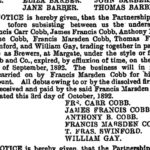 “Margate” hangs on as a descriptor of ale longer than most of its 1600s classmates mainly through the long success of Cobb’s Brewery. A brewery appears to have operated at the site from no later than the first decade of the 1700s. Cobb brewed there from 1760 through to the early 1800s when it owned 53 public houses and three farms and, then, for many decades thereafter. A second local brewery owned by the family from 1808 had a circular brew house. As The London Gazette of 11 October 1892 indicates, it returned to sole proprietorship from the 1890s to the 1937 when FM Cobb died in his 90s. The brewery sold Margate stout in the mid-1900s. The National Archive listings indicate that the sizable Cobb empire generated brewery records right up to 1967 right around when Whitbread bought it and shut it.
“Margate” hangs on as a descriptor of ale longer than most of its 1600s classmates mainly through the long success of Cobb’s Brewery. A brewery appears to have operated at the site from no later than the first decade of the 1700s. Cobb brewed there from 1760 through to the early 1800s when it owned 53 public houses and three farms and, then, for many decades thereafter. A second local brewery owned by the family from 1808 had a circular brew house. As The London Gazette of 11 October 1892 indicates, it returned to sole proprietorship from the 1890s to the 1937 when FM Cobb died in his 90s. The brewery sold Margate stout in the mid-1900s. The National Archive listings indicate that the sizable Cobb empire generated brewery records right up to 1967 right around when Whitbread bought it and shut it. The term “Margate ale” is also used generically into the nineteenth century including in 1866’s Passages from the auto-biography of a “man of Kent” on the life of Robert Cowtan. It also appears in the 1869 book Mrs. Brown in London by one Arthur Sketchley. And if you click on the image to the right you will see a passage from 1871’s publication Lectures on the Principles and Practice of Physic as delivered at King’s College, London by Sir Thomas Watson in, likely, the 1830s. Like Gayton above, his fellow medical professional counterpart of two centuries before, no dummy. Later in life, a physician to Queen Victoria. And note that the “cure” he is speaking of, the thing that he cannot discount Margate ale helping with, is abdominal tumours. Jings. Could it really do that? Perhaps it just couldn’t hurt.
The term “Margate ale” is also used generically into the nineteenth century including in 1866’s Passages from the auto-biography of a “man of Kent” on the life of Robert Cowtan. It also appears in the 1869 book Mrs. Brown in London by one Arthur Sketchley. And if you click on the image to the right you will see a passage from 1871’s publication Lectures on the Principles and Practice of Physic as delivered at King’s College, London by Sir Thomas Watson in, likely, the 1830s. Like Gayton above, his fellow medical professional counterpart of two centuries before, no dummy. Later in life, a physician to Queen Victoria. And note that the “cure” he is speaking of, the thing that he cannot discount Margate ale helping with, is abdominal tumours. Jings. Could it really do that? Perhaps it just couldn’t hurt. Lambeth. Let’s look at this ale as a last consideration. We’ve written a bit about Hull ale before so, yes, let’s look at Lambeth. Well… except that in the 1670s the poet Andrew Marvel in his side gig as Member of Parliament for the city of Hull wrote a fair bit back to the municipal corporation about the taxation of beer. But set that aside. Let’s look at Lambeth. One problem as Martyn mentioned over at Facebook: “It’s a bit of a mystery where Lambeth Ale was actually brewed.” If you click on that image you will see one reason why. It’s a map from the 1720 edition of Stow and Strype – and even at that time Lambeth was mainly filled with fields and physically distinct from the actual City of London. Consider this painting from the 1680s by F.W. Smith. Open grounds down to the Thames sit all around Lambeth Palace, London residence of the Archbishop of Canterbury. Where’s the brewery?
Lambeth. Let’s look at this ale as a last consideration. We’ve written a bit about Hull ale before so, yes, let’s look at Lambeth. Well… except that in the 1670s the poet Andrew Marvel in his side gig as Member of Parliament for the city of Hull wrote a fair bit back to the municipal corporation about the taxation of beer. But set that aside. Let’s look at Lambeth. One problem as Martyn mentioned over at Facebook: “It’s a bit of a mystery where Lambeth Ale was actually brewed.” If you click on that image you will see one reason why. It’s a map from the 1720 edition of Stow and Strype – and even at that time Lambeth was mainly filled with fields and physically distinct from the actual City of London. Consider this painting from the 1680s by F.W. Smith. Open grounds down to the Thames sit all around Lambeth Palace, London residence of the Archbishop of Canterbury. Where’s the brewery?




